
*
Mothers and musicals. They are not easy, especially when mixed up together. Have you met Rose from Gypsy? Have you met the Witch from Into the Woods? Have you met crazy Sally Durant in Follies? They are all seriously complicated. And so it is with Leigh Conroy (played by guest star Bernadette Peters, the two-time Tony Award winner, who has played all of the above roles) on TV's "Smash." In Episode 7, she pops up in New York just in time to attend the workshop presentation of Marilyn the Musical, which will feature her blonde daughter Ivy (Megan Hilty) as the tragic blonde Marilyn Monroe. Narcissistic Leigh cannot resist slipping into a rehearsal to steal some focus away from Ivy, thrilling the creative team and the chorus kids. At the insistence of the gypsies (one of whom saw Leigh in Gypsy at Connecticut's Westport Country Playhouse maybe 15 years ago), Leigh gladly sings Gypsy's "Everything's Coming Up Roses," complete with judicious trims, accompanied by composer Tom (Christian Borle), who knows the accompaniment (and apparently Leigh's key) by heart. Singing the song to her daughter is a creepy and uncomfortable parallel to the Rose/Gypsy Rose relationship in the essential musical by Arthur Laurents, Stephen Sondheim and Jule Styne. Mama has just hijacked her daughter's room, and it's one of several plot points putting pressure on Ivy in this hour.
By the way, if you are reading this and you are 16 years old and you live in Pocatello, Idaho, and you love "Smash" but you've never heard of Gypsy, you must stop reading this column right now and get the original cast album (Sony's MasterworksBroadway.com is a good place to start for information, and you'll also find it at playbillstore.com) — or you might even try the 2003 revival cast album that featured Bernadette Peters as voracious stage mother Rose.
On "Smash," Leigh Conroy is not a stage mother, but a Tony-winning Broadway star who is wildly uneasy with her daughter's career. Competitive? You bet. Like the best of "Smash" creator Theresa Rebeck's characters, her behavior is complex: Is she envious of her daughter's ascendance? Is she stingy with praise because it reduces her own sense of self? Is she cruel or protective? Is she a witch? We know she is supernaturally gifted: She can sing "Everything's Coming Up Roses" on command at 10 AM without warming up.
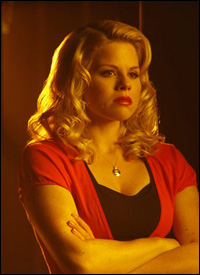 |
||
| Megan Hilty |
||
| photo by Eric Liebowitz/NBC |
Some highlights of (and comments about) Episode 7:
FICKLE FRIENDS: Those chorus kids Jessica, Dennis, Bobby, and the rest, are changeable as weather. First, they're on the side of rising-star Ivy, then they take pity and side with Karen (Katharine McPhee) and advise her on how to succeed in the workshop world. When Karen gets an appointment with powerful record producer Bobby Raskin (yet to be seen), who has arranged studio time and an engineer for her to cut a demo ("Brighter Than the Sun," the Colbie Caillat pop song), the workshop gang tells her that she should quit the workshop and take the pop meeting. Look, they say, you're only getting $200 a week for the workshop and this musical isn't a sure thing. "No one will hold it against you," they say. This glib statement is some of the worst advice in theatre history, and seems inconsistent with what has been (or should be) in the heart of every artist working on Marilyn the Musical (or any other piece of art, commercial or otherwise): the unstoppable hope that their artistry will find the light of day and reward their souls, feed their bank accounts and fuel a future. In the real world, who would hold it against you for quitting a $200,000, four-week workshop the day before potential backers come see it? Everyone would hold it against you: the producer, the writers, the casting director, the director, the choreographer and, perhaps especially, the very ensemble members who said she should quit. The burden would be on the chorus to fill in the gaps of an already lean experience. That Karen rejects their advice and sticks with the workshop proves her class and loyalty. We've decided that bad karma will keep Jessica, Bobby, et al, in the chorus for a long time to come.
| |
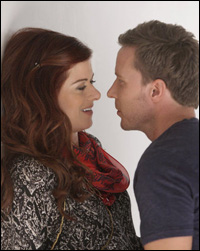 |
|
| Debra Messing and Will Chase | ||
| photo by Eric Liebowitz/NBC |
CURSED: Is the workshop cursed? First Ivy has vocal trouble, and now the building that houses the rehearsal studios where the workshop will be presented, has an overactive boiler, and the temperature is oppressive. They've got steam heat, you see. Eileen confronts the building manager, who is no help. She takes matters into her own hands. On the recommendation of a downtown bartender, Nick (Thorsten Kaye), she stealthily makes her way to the boiler room of the studio building, breaks a door lock (swinging a massive pipe wrench) and sends her men in. This fanciful act in the teleplay by Jason Grote (the playwright of 1001, the regionally-seen postmodern look at "The Arabian Nights") is roughly akin to the notion of Tony Award-winning producer Daryl Roth (The Normal Heart) shinnying up a fire escape to get to a rooftop HVAC unit to repair the air conditioning, all while wearing a Chanel suit. Eileen's effort is in vain. The room remains uncomfortably hot for the Marilyn presentation. CAA agent-to-the-stars Joe Machota (a real agent and former Sky of Broadway's Mamma Mia!) was reportedly in the room, but slipped out unnoticed. He might be used later to provide a movie star to take the role of Marilyn. (By the way, the building manager that Eileen spars with is Brad Oscar, the great American character actor who was Tony-nominated for playing Franz in The Producers; he graduated to Max Bialystock on Broadway and on tour. We're hoping he gets a pair of spectacles and is reinvented as a different character in a future season of "Smash." He is too good to ignore.)
| |
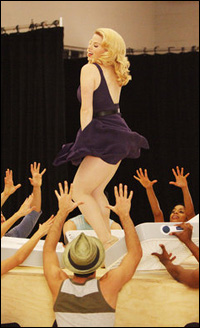 |
|
| Megan Hilty in the Marilyn presentation. | ||
| Photo by Eric Liebowitz/NBC |
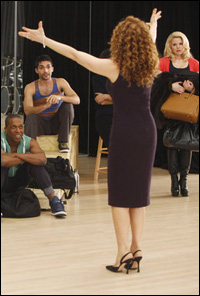 |
||
| Bernadette Peters wows the kids as Ivy's Tony-winning mom. |
||
| photo by Eric Liebowitz/NBC |
IVY AND DEREK: The public dressing down that Ivy gave Derek last week (when she said he was cruel — and not great in bed) is just a memory. Like Tom and John's apparent breakup, her public lashing-out is forgotten and forgiven. "Are we good?" puppy-dog Derek asks Ivy. She forgives him his sins, and he seems to be adjusting his behavior. "You're wonderful in this show, and you're gonna be great tomorrow," she says. During intermission of the workshop he is candid but not unkind about the slightly shaky Act One. He tells Ivy he's giving her a note as her director, not her lover: "Get your head in the game," he says. "I need you to focus." Tom doesn't like Derek giving notes to the company at intermission, but Tom doesn't really have a leg to stand on in the sensitivity department: He accompanied Leigh's earlier performance of "Everything's Coming Up Roses," allowing Ivy's mother to take over Ivy's rehearsal room. Discuss.
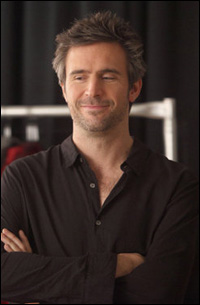 |
||
| Jack Davenport |
||
| Photo by Eric Liebowitz/NBC |
SCAPEGOAT: Stricken after (the apparently conscienceless) Michael Swift's wife and child come to visit a workshop, Julia flees to her Brooklyn home and discovers her son, Leo (Emory Cohen), getting high. He knows she's having an affair and is apparently acting out. Julia knows she must end it, but Michael resists the end of the secret relationship, thinking it might be the start of something better than their marriages. "I'm not yours to order around," Julia tells Michael when she is forced by Derek to improvise dialogue in order to activate a Marilyn Monroe/Joe DiMaggio scene that isn't working. "I'm not yours!" At episode's end, it is decided by Tom and Julia (with Eileen's approval and to Derek's dismay) that Michael is the reason for the failure of the workshop, and he is fired. Julia goes home and tells her teenage son of his dismissal, and he weeps in her arms, relieved and forever changed by the secret.
LURKERS: Lurking is turning out to be a trend in "Smash." Last week, Karen dropped her sheet music behind the piano, knelt to pick it up and was obscured from the view of the creative team, who talked about replacing Ivy due to her illness. This week, Ellis is hiding in a rehearsal room where Michael and Julia have a sloppy makeout session. And when Ivy tells her mother off in the studio — spitting out that mama is prone to "sucking up the light like a black hole," that mama's cruel and withholding, that Marilyn was an "unhappy drug-addicted disaster because her mother didn't love her" — the camera reveals that Derek has been witness to the confrontation, a few feet away from them. The only sure place for a private exchange in the world of "Smash" may be an elevator. Unless Eileen has access to the digital video files from the security cameras. Then, all bets are off. (Kenneth Jones is managing editor of Playbill.com. Follow him on Twitter @PlaybillKenneth.)
Check out the earlier "Smash" Report recap of Episode 6. View Playbill Video's earlier visit with cast and creatives of "Smash."










